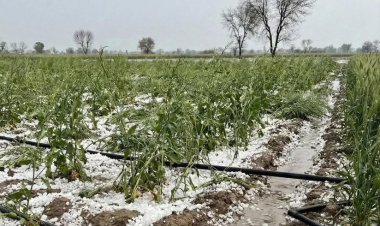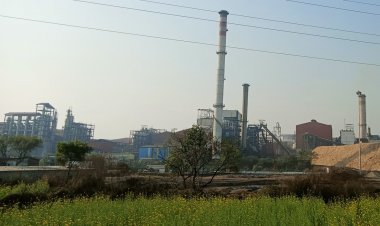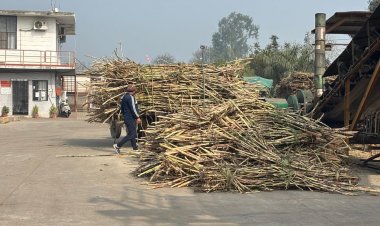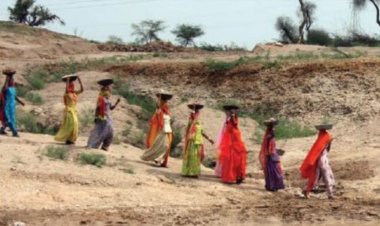Govt should assess farmers’ loss due to rain soon and give compensation: Farmer organizations
The Kharif crops that were nearly ready to be harvested in several states, including Haryana, UP, Uttarakhand and Punjab, have suffered a massive loss due to the heavy rain last week. Basmati and other early varieties of paddy have been severely hit in Haryana, Punjab and Western UP. Also, the crops of bajra (pearl millet) and vegetables have borne the brunt. Farmer organizations have demanded that compensation be given by the government to the farmers to compensate for their economic loss. They say that farmers had gone for dearer crops like Basmati in the hope of better income, but now they have suffered a loss. They also say that just as the government imposes fines on the stubble-burning farmers on the basis of information obtained from satellites, can’t it use the same technology to assess the losses suffered by the farmers?
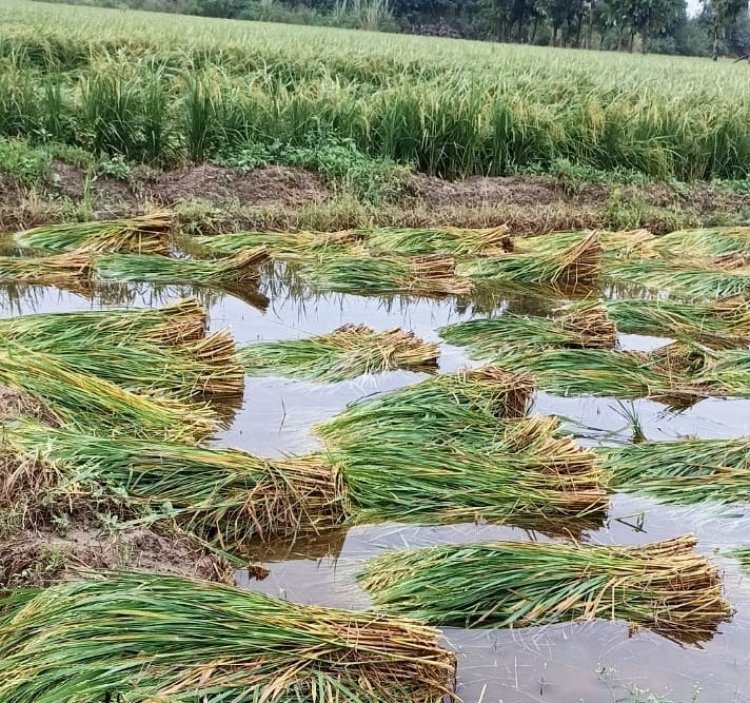
The Kharif crops that were nearly ready to be harvested in several states, including Haryana, Uttar Pradesh (UP), Uttarakhand and Punjab, have suffered a massive loss due to the heavy rain last week. Basmati and other early varieties of paddy have been severely hit in Haryana, Punjab and Western UP. Also, the crops of bajra (pearl millet) and vegetables have borne the brunt.
Farmer organizations have demanded that compensation be given by the government to the farmers to compensate for their economic loss. They say that farmers had gone for dearer crops like Basmati in the hope of better income, but now they have suffered a loss. They also say that just as the government imposes fines on the stubble-burning farmers on the basis of information obtained from satellites, can’t it use the same technology to assess the losses suffered by the farmers? The government should decide to compensate for the farmers’ loss as soon as possible. Speaking to Rural Voice, officials from several farmer organizations in the country and farmers from the loss-making affected states have raised this demand.
Bharatiya Kisan Union (BKU) General Secretary Yudhvir Singh said in an interview to Rural Voice that while several states in the country had suffered due to drought, others had done so due to excess rainfall. The government should survey the states that have suffered from either situation and compensate for the farmers’ loss immediately. Singh said that farmers in Eastern UP, Bihar and Jharkhand could not sow several crops, including paddy, due to drought this year. Also, crops dried up due to less rainfall, which led to severe loss to the farmers. On the other hand, several crops, including soyabean, have been destroyed in Maharashtra due to excessive rainfall. Cotton farming was substantially affected in Punjab due to less rainfall, causing quite big an economic loss to the farmers.
Yudhvir Singh said that when the farmers’ paddy, bajra and vegetable crops that remained after the drought were ready to be harvested, heavy rain destroyed them in the fields. So, the government should go for a quick survey and compensate for the farmers’ losses.
Rashtriya Kisan Mazdoor Sangathan (RKMS) Convener VM Singh told Rural Voice in an interview, “On the one hand, due to less rainfall and drought, paddy and sugarcane farmers had to incur greater cost on irrigation and pesticides. This had already put the farmers in a bad economic situation. Now, this sudden heavy rain has led to an excessive loss to the crops of paddy, bajra and sugarcane of the farmers from Punjab, Haryana and UP.” Singh added, “Insurance companies insure farmers’ crops every year. The government has the entire survey system available. The government should make full payment for crop insurance to the farmers because the farmer gets the entire crop insured. But the government always cuts corners in this. It merely ticks the boxes in the name of insurance.” Singh said that the government should waive the farmers’ loans in such trouble so that they might get some relief.
Karmbir Singh, a Bharatiya Kisan Sangh (BKS) official and head of the UP Sugarcane Cell, said to Rural Voice, “The farmers were already suffering a loss this year due to the drought. The sudden rain now has caused massive loss to paddy, vegetables and sugarcane, which has ruined the farmers financially to a large extent. On the other hand, farmers are much in trouble due to Lumpy Skin Disease (LSD) in cattle. But no help has been provided to the farmers from the government so far.” Singh demanded that just as the government imposes fines on the stubble-burning farmers on the basis of information obtained from satellites, it should similarly assess by means of the satellites the losses suffered by the farmers on account of drought and rain and give compensation to the farmers as soon as possible.
The affected farmers have also demanded compensation from the government. Netrapal Sharma, a farmer from the Satwara village of Bulandshahr district, said to Rural Voice, “I had cultivated Basmati paddy in 15 acres for greater profit. This includes Pusa Basmati 1692, 1509 and Pusa Basmati 1121. Most of the farmers in my village are growing Basmati paddy because farmers had hoped to sell Basmati paddy at Rs 3,600 per quintal this year. We get yields of about 18-22 quintals of Basmati in an acre. The prices are better compared to ordinary paddy.” Netrapal said that the recent heavy rain had caused about 15-20 per cent loss. He said that the early crops that had been harvested remained lying in the fields and the grains of the Basmati paddy crop were now turning black. Which will fetch the farmers less price. Basmati 1121, which is the largest sown Basmati paddy variety, fell in the field, causing 30-40 per cent loss while the dwarf varieties of Basmati 1692 and 1509 fell less. Those farmers have been more affected whose crops had been harvested and were lying in the field. Netrapal said, “My crop has not been harvested yet, but still I have suffered about 15-20 per cent loss.”
Farmers from the Nekpur village in Bulandshahr district told Rural Voice that Basmati paddy had been cultivated on about 450 acres in his village. There has been a loss of 50 per cent due to the rain. In this village, Pritam Singh had cultivated Basmati paddy on two acres, Tejbir Singh on two acres and Satvir Singh on five acres. This was lying in the fields after harvesting. There is apprehension that the rice grains may turn black due to waterlogged fields and rice will fetch only half the price than normal due to more breakage and change in colour of the rice on account of excessive moisture. These farmers say, “The less rainfall earlier led to more irrigation of the paddy, thus causing an increase in the cost of the paddy crop. This has been a double whammy for us.”
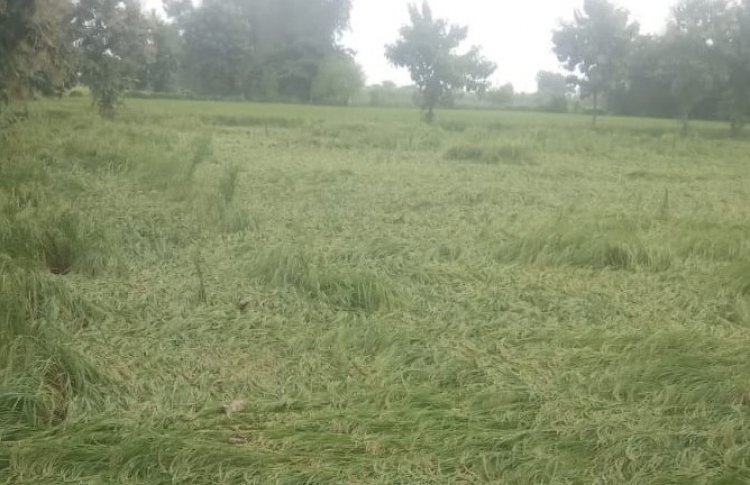
Sonu Kumar, a farmer from the Khurampur village in Sonipat district of Haryana, told Rural Voice that he had planted Basmati paddy crop in 12 acres this year. “Our crop was ripe and ready but the sudden rain has led to flood-like conditions in seven to eight villages, including ours, as the water level has increased. Our crops are submerged. If water does not drain out of the fields in a day or two, the entire paddy crop will be spoilt. And even if it drains out in a day or two, there will be at least a loss of 50 per cent. Because an excess of water will prevent harvest at present and the crop will fall on the ground, due to which the paddy grains will shed and get spoilt.” Kumar added, “This rain has wiped away all our labour.” He also said, “We have got the crop insured but the insurance company is yet to survey it.”
Rakesh Kumar, a farmer from the Jaunpur village of Sonipat district, told Rural Voice that he had planted the 1509 variety of Basmati paddy. But he fears that the crop may get spoilt as the water level rises in the Yamuna due to rain. He said, “I had planted cauliflower in an acre only recently. And there was bottle gourd in one acre.” But both his crops have been destroyed due to the heavy rain.
Gurbaksh Singh, a farmer from the Bimbar village in the Sangrur district of Punjab, said to Rural Voice, “The paddy crop in our area was ripe for harvest. We were preparing to begin the harvest. But this rain has now delayed it and the grains will fall in the field.” He said, “On the other hand, the paddy crop of many farmers had been harvested and piled up to be sold in the mandis. But the paddy got wet due to the rain, which caused the farmers a substantial loss.” He said that in Bhatinda in Punjab, where cotton is grown on a large scale, the rain has spoilt the cotton and this will result in lesser prices for the farmers. Also, farmers in Jalandhar and Hoshiarpur had planted early potato crops, but the potato seeds have rotted due to waterlogged fields, causing much loss to the farmers.



 Join the RuralVoice whatsapp group
Join the RuralVoice whatsapp group



















